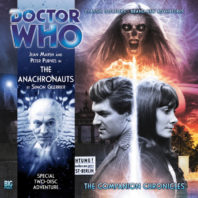
Released January 2012
Writer Simon Guerrier proved beyond the shadow of a doubt that Sara Kingdom holds a wealth of storytelling opportunities to be explored in his acclaimed trilogy that began with ‘Home Truths.’ Given the hints at missing adventures featuring the Doctor and Steven that she related, bringing Jean Marsh together with Peter Purves and his brilliant interpretation of the First Doctor was always going to be the next logical step, and Guerrier’s ‘The Anachronauts’ finally allows that opportunity to develop as an experimental timeship crashes into the TARDIS and nothing can be taken as a certainty.
It’s only natural that Sara would want to ask the survivors of the timeship that originates from far in her future what became of Mavic Chen, but the Doctor is sternly at his most imperious here as he refuses to allow her to ask and instead becomes enthralled by this ship’s abilities while being worried about the potential loss of his own following the crash. The First Doctor was always one to let his indignation and sense of righteousness shine through no matter the circumstances, and while threatened with losing the one link to his own planet and people he becomes infuriated that humanity is even contemplating the use of time travel as a weapon, a simmering fury that Purves plays perfectly and lets loose in full when Steven is taken to the brink of death. Shockingly, and yet still wholly in line with the character given how Ian and Barbara came to join the Doctor on his travels, he would rather kidnap and abandon these pilots than return them to their own time because of their time travel knowledge and the dangers it could pose. With Purves and Marsh both playing multiple roles that capture the tense anxiety of the pervading uncertainty on this desert island filled with ghosts, these first episodes deliver a fascinating experience that culminates in a brilliant revelation that makes perfect sense of everything that comes before it.
Unfortunately, the second half of the story that changes its locale to 1966 Berlin with Steven and Sara trapped on the wrong side of the wall can’t quite live up the intrigue of the first as it follows a much more traditional storytelling route filled with captures and escapes. While the convenience of Steven having studied this particular geography in school is integrated quite well and the story proudly draws attention to the fact that clichés are not yet clichés in this time, the story itself with its subtle environmental details can’t manage to deliver the same level of intrigue as the desert island locale, and using essentially the same twist for this second half rather gives away the fact that this story was written as a last-minute fill-in. Still, the fact that these two separate stories each hold together so incredibly well given that pressure is an absolute testament to Guerrier’s abilities and it’s only in comparison to the first half that the second is comparatively more underwhelming despite including so many classic tropes that would otherwise provide the backdrop for a truly fascinating adventure.
Of course, Guerrier has always excelled with his characterisation, and ‘The Anachronauts’ absolutely continues to showcase the genuine understanding he has of these main characters. Switching narration between Steven and Sara allows for the same events to unfold from wholly different perspectives, and it’s telling that it’s the most subtle changes in Sara’s characterisation that reveal to Steven that these events are not genuine. It’s hinted that Steven would likely enjoy Sara being more open to a relationship with him, but he knows that the slightly more emotional and loving woman here is simply not the Sara that he knows nor the woman she will likely ever become. With Sara narrating her emotions right up until this reveal, the maximal impact is delivered, and Marsh and Purves again excel in fleshing out another potential layer of their brief companionship. The First Doctor era was certainly never afraid of telling stories that explored in more of a sideways direction than a forwards one, and ‘The Anachronauts’ revels in the mystery and inconsistency of its distinctive environments to highlight the TARDIS’s magnificent capabilities without the need for a framing device, at times becoming repetitive but delivering what essentially amounts to two engaging stories in the fairy tale and historical thriller genres that prove just how dynamic this particular era has the potential to remain.
- Release Date: 1/2012


Leave a Reply